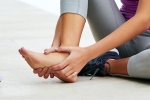Home » Blog
| Stem Cell, PRP, Acupuncture in Queens & Long Island, New York
Blog | Stem Cell, PRP, Acupuncture in Queens & Long Island, New York
Your every day habits can play a role in developing chronic back pain. Here are a few simple things to keep in mind each day to reduce back pain. 1. Support Your Spine at Your Desk - Compared to standing, sitting places increased stress on your spine and spinal discs. So prolonged sitting with poor postures, such as slouching forward, may contribute to back pain.1 Here are a few tips to better support your lower back while you sit: Keep knees bent at about a 90-degree angle with feet flat on the ground. If needed, adjust your seat height so that your hips are about the same height as or slightly higher than your knees, which reduces stress on your lumbar spine.
Read more
Your Shoes - High heels, for example, put more pressure on the balls of your feet, which can thin your foot’s natural padding where you need it most. Avoid heels higher than 2 1/4 inches when you’re going to do a lot of walking. Flip-flops and overly pointed or flexible shoes also could lead to foot pain. You can avoid this if you match the shoe to the activity and make sure of proper fit and support.
Read more
Posted on: 04-Oct-2021 | No of views: 2642
When we think of pain, we usually think of injury or illness, but it's actually common to experience real physical pain without an injury being present! It’s natural when we think about pain to associate it with hurting ourselves, typically we think of an injury that causes pain. However, pain can occur without any injury, or even after an injury has healed. Essentially this is what chronic pain is: pain that is ongoing for a long period of time, typically thought to be three months or more, having passed the usual healing time.
Read more
If you have lower back pain or sciatica, you probably want to know how to relieve your pain and prevent flareups or recurrences. Avoiding bed rest and staying active can help you do both. Staying active can include a combination of strategies, such as continuing your daily activities, adding a simple exercise, such as short walks, and/or following a structured and guided exercise program. This blog explains the potential side effects of continued bed rest and the unique benefits of engaging in low-impact physical activities with back pain.
Read more
De-Stress: Standing Forward Bend - If you feel anxious or stressed, a quick time-out can help. Try this simple yoga move. Stand straight, legs together. As you breathe in, raise your arms high over your head. Bend forward at your hips as you breathe out, keeping your upper body aligned. Grasp your calves or ankles. Breathe deeply and hold about a minute. Breathe in and slowly come back up, head and arms lose and relaxed, to standing.
Read more
Like many of my own patients, you may be interested in doing more to treat pain than just relying on medications, but you aren’t sure where to start. One simple and accessible treatment to consider is something known as TENS, or transcutaneous electrical nerve stimulation. TENS is a handheld device that sends electrical impulses through small electrodes by adhesive pads attached to your skin. The pads are usually placed right on the part of your body that hurts. When the device is turned on, the electrical impulses flow into the skin and have the potential of decreasing different types of pain.
Read more
When a disc in your lower spine bulges or tears, you may feel pain in your lower back and/or your leg. Here are 3 unique signs of a herniated or protruding disc to help you identify the underlying cause of your lower back problem: 1. Pain While Sitting - An activity that exerts tremendous pressure on your lower spinal discs is sitting. If you have a herniated or bulging disc, this increase in pressure within your disc may cause the bulge to become more pronounced, which may aggravate your lower back pain when you sit.
Read more
What Are Calf Muscles? There's a group of muscles on the back of each lower leg that doctors call "calf muscles." They play a key role in helping you walk and run. Lots of things can make them hurt, from a minor sprain to more serious problems like deep vein thrombosis
Muscle Cramp - If you work your calf muscle too much, you can get a sudden pain in your leg. A muscle cramp can also happen if you hold a position too long or haven't had enough water to drink.
Read more
Now that we are entering a new phase in the COVID-19 pandemic where access to vaccines is high, infection rates are declining, and there is greater access to health-related services, this might be a time to reevaluate your pain management plan and consider what changes can make a positive impact. Let’s start by taking a look at some of the ways the pandemic may have increased your pain problem:
Emotionally drained. Certainly, life during COVID-19 has been a source of intense stress.
Read more
In response to America’s opioid epidemic, physicians, pharmacists, and even insurance companies have been increasingly raising the bar on who can receive opioid medications in addition to how much and for how long. It’s not just the addiction risk that calls for caution when using opioids to treat chronic neck or back pain though long-term use of opioids may also worsen the pain.
Read more
Love this Post? Spread the World






















